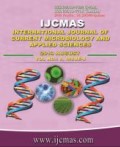


 National Academy of Agricultural Sciences (NAAS)
National Academy of Agricultural Sciences (NAAS)

|
PRINT ISSN : 2319-7692
Online ISSN : 2319-7706 Issues : 12 per year Publisher : Excellent Publishers Email : editorijcmas@gmail.com / submit@ijcmas.com Editor-in-chief: Dr.M.Prakash Index Copernicus ICV 2018: 95.39 NAAS RATING 2020: 5.38 |
Interspecific hybridization in okra is of immense value to exploit the diversity of species in the genus Abelmsochus for developing male sterile lines and/or advance breeding lines possessing resistance to YVMV and ELCV diseases. The present investigation was carried out during the year 2015-16 to study the pattern of interspecific hybridization in genus Ablemoschus involving ten wild species viz., A. angulosus var. angulosus, A. angulosus var. grandiflorus, A. caillei, A. ficulneus, A. manihot ssp. tetraphyllus, A. moschatus, A. tetraphyllus var. pungense, A. tetraphyllus var. tetraphyllus, A. tuberculatus and new taxa IC 0433556 with eight genotypes of cultivated species (Abelmoschus esculentus). Hand pollination was undertaken; fruit set, seed set, seed germination and pollen viability per cent were calculated. From the present investigation, it was found that the cultivated A. esculentus genotypes were compatible as male parents with A. caillei, A. manihot ssp. tetraphyllus and A. tetraphyllus var. tetraphyllus, A. tuberculatus. Interestingly, there was no compatibility when A. tetraphyllus var. pungense and new taxa IC 0433556 crossed with cultivated okra genotypes (IIHR-285 and 10-11-594). However, there was limited fruit set observed in A. angulosus var. angulosus, A. angulosus var. grandiflorus, A. moschatus and A. ficulneus. The F1 seeds thus obtained were failed to germinate due to non-viable seeds. The significant difference (p<0.01) was found among the interspecific hybrids for pollen viability per cent. Germination per cent was higher in wild and cultivated parents than that of interspecific hybrids. Crossability index per cent was ranged from zero to hundred per cent (0-100%) among the selected cross combinations.
 |
 |
 |
 |
 |